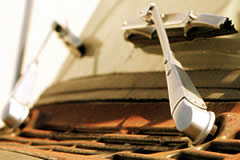Windshield Wiper Maintenance Tips - Vol.288
While it is often overlooked, windshield wiper maintenance is very important for every vehicle. How well your wipers work directly impacts your level of visibility as a driver, and visibility is key to safe driving. If you cannot see where you are going, or even if your vision is impaired only a little, you are far more likely to have an accident. Keeping your windshield wipers healthy and well maintained is easy, by understanding what affects your wipers and how to check them, you can have a safer and more enjoyable driving experience.

How the Elements Affect Your Windshield Wipers
- Sunshine, especially ultraviolet light from the sun's rays will cause the windshield wipers to become dry, cracked, and brittle over time.
- Moisture, above and beyond standard rain, will cause your windshield wipers to deteriorate more quickly. This can include acid rain as well as salt water.
- Debris delivered to your windshield wipers via wind and driving will affect the quality of your windshield wipers. Any time the wind propels sand, dust, and mud at your windshield wipers, these abrasive forms of debris can eat away at the rubber.
- Oil is not healthy for windshield wipers, and the biggest culprit is car waxing. Most of the waxes that people utilize on their vehicles to keep their paint safe have a compound inside that eat away at the rubber.
Proper Windshield Wiper Maintenance
- Keep your windshield wipers clean. A good rule of thumb is to wipe off or gently wash your windshield wipers each time to fill your gas tank. By adding this step to the fill up process, you won't have to remember to do it separately. Even if you tend to fill your gas tank once a week, the added cleaning will not hurt your wipers.
- Use your windshield wipers as they were intended. This means that yes, you should use your wipers to slick water and rain from your windshield, as well as light dust. This does not mean that you should use your windshield wipers to remove frost and ice from your windshield. The rubber on your wipers was not meant to contend with ice. The rubber on your windshield wipers was also not meant to deal with tough or caked-on mud. If your vehicle has gotten so dirty that your glass surfaces are covered in mud, you will need to wash your car manually.
- If you live in an area that snows, or regularly reaches freezing temperatures, pull your windshield wipers away from the body of your vehicle. This will prevent ice from forming under the blades, thus keeping them from sticking to your vehicle.
When to Replace Your Windshield Wipers
- Windshield wipers should be replaced every six to nine months. There are some car experts that will tell you to wait until you hear squeaking or see a visible issue with your wipers. Unfortunately, in these circumstances, the windshield wipers are already too far gone, and could be causing damage to your windshield at this point.
- When you inspect your windshield wipers, look for any visibly broken pieces. This could include the frame or rubber parts, as well as the hinges and joints. If you find any broken parts, the windshield wipers should be replaced.
- If when using your windshield wipers you notice streaking on the glass or hear a chattering noise, the wipers should be replaced very soon.
Windshield wiper maintenance is not difficult, but often overlooked. By keeping up on your windshield wipers, you will ensure a safe ride, better visibility, and prevent future damage to your windshield.